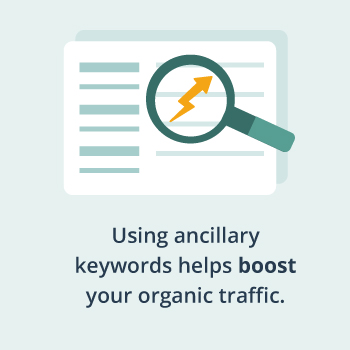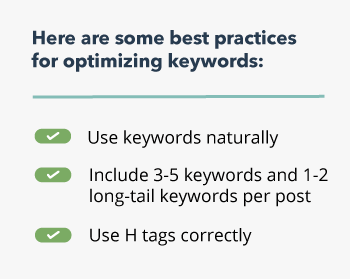Let’s say you own a donut shop. You’ve been making donuts for decades and your blog is rich with donut-related topics. You would never dream of making anything except donuts. So, why does your digital marketing agency suddenly want you to write about wedding cakes?
The simplest explanation: using ancillary keywords helps boost SEO. 
What are ancillary keywords? Ancillary keywords, or secondary keywords, are keywords adjacent to your topic that convey nuances and address subtopics. By incorporating these words into your copy you can increase your site’s search engine value. Most importantly, it will provide valuable information to your audience and let them know you’re an expert in more than just donuts.
Leveraging Primary and Secondary Keywords
To really understand secondary keywords, you have to know how to use primary keywords. Going back to our donut shop example, your primary keywords would likely be something like: “donut,” “donuts near me,” or “best donuts.” They’re the terms directly related to your business and the ones you most want to rank for.
Secondary or ancillary keywords are the terms that complement your primary keywords. They’re related to your business but not exact, like “coffee,” “baked goods,” or, yes, “wedding cakes.” Using ancillary keywords to supplement your primary keywords allows you to share your knowledge about your industry, regardless of whether you make cakes or not.
In addition to simple, single-word terms, it’s important to use long-tail secondary keywords. These are exactly what they sound like: long-tail keywords made up of your ancillary terms that are usually three or more words. These generally get higher conversions because they’re more specific, which is why they’re important to include in your SEO strategy. For your donut shop, you might use “coffee and donuts,” “how to make donuts,” or “best donuts in Portland.”
How to Optimize Keywords
So, you’ve taken the advice of your digital marketing agency and you’re ready to start writing blog posts about wedding cakes. Where do you start?
If you haven’t completed an SEO audit in awhile, now would be a good time to do so. Solidify your primary keywords, then start researching the ancillary keywords you want to target. Choose some topics within your industry you could write about based on what your audience is searching for. Readers crave relevant and valuable insight that speaks to them and their needs.
For example, it’s wedding season—what’s trending in the industry? What’s a unique take on wedding cakes that you could share? Perhaps you could write a blog post about how to serve donuts instead of wedding cake. Or maybe you have a great recipe for a donut cake that would be the perfect blend of tradition and creativity. Learn what matters to your audience and provide answers to their questions—even if it’s not directly related to your business.
Once you’ve completed your audit and selected your primary and secondary keywords, it’s time to start writing. Here are some best practices for optimizing keywords:
- Use keywords naturally. Don’t try to add keywords where they don’t belong (called “keyword stuffing”). A good rule of thumb is to write for the person, not the search engine.
- Include 3-5 keywords and 1-2 long-tail keywords per post. When in doubt, use fewer keywords well. The goal is to share your expertise, and this can and should be accomplished with multiple blog posts.
- Use H tags correctly. Headers (known as H tags) are your best friend. Include at least one of your primary and secondary keywords in an H2 tag.
Most importantly, make sure your content is relevant and engaging. When readers enjoy reading your content they:
- Return to your site for the latest news.
- Spend longer periods of time on-page.
- View more pages of your website.
- Share links with friends and family.
This all leads to more indexed pages and traffic flowing to your donut shop’s website.
Start Using Ancillary Keywords Like a Pro
As SEO experts, we’re here to help you think outside of the (cake) box. Get in touch to learn how we can help optimize your website and implement the best SEO strategies in the biz.

